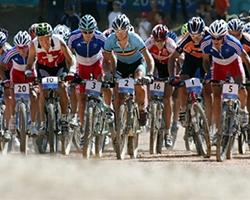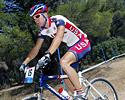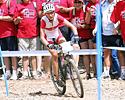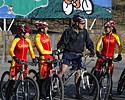
Recently on Cyclingnews.com |
MTB index page for all MTB content
MTB News Feature, February 6, 2008
The American road to the big show
After a much-maligned selection process for the 2004 Olympic Games mountain bike team, USA Cycling updated the criteria for making the Olympic Team in 2008. Cyclingnews correspondent Jackson Weber took a look at what has changed for 2008 and what impact it might have on elite American mountain bike racing.

|
Somewhere in Colorado Springs, someone at USA Cycling may be whispering sweet nothings to Madonna del Ghisallo that controversy doesn't rear its head again in 2008 with the US Olympic Team final mountain bike team selections.
The problems of the 2004 selection were dramatic enough that they drew the attention of Gripped Films, producers of the documentary movie Off Road to Athens. Then, the selection process ended in arbitration for the women. In response, for the 2008 Olympic Games, USA Cycling came out with a new plan, a new system and a new support structure, all designed to prevent a repeat of four years ago.
2004 - Off-track to Athens
In 2004, USA Cycling selection procedures dictated that the primary way to select the Olympic team was to provide automatic nominations for any mountain biker who placed in the top three at the 2004 UCI World Mountain Bike Championships. If no athlete met this criterion, athletes would be selected according to their place in the UCI rankings.
The system had one apparently unforeseen consequence that proved devastating for some of the riders. Because so many events offered UCI points, athletes in the running for the Olympic team couldn't afford not to race every weekend for fear of some other athlete digging up a few extra UCI points and moving ahead in the rankings.
"The 2008 process prioritizes results in world-class competition only and allows athletes to follow a more focused race schedule and preparation program."-USAC's spokesman Andy Lee on how the US Olympic Team selection process has changed. |
What ensued was a "Greatest Race" style escapade for American racers who roamed the globe questing for precious points. Ask just about anyone except perhaps Adam Craig, and for the elite men, things appeared to go relatively smoothly with Jeremy Horgan-Kobelski (JHK) and Todd Wells making the team.
In contrast, on the women's side, all hell broke loose. Thanks to the UCI's approach to maintaining its rankings at the time, when the points chase came to a close, no one was sure if Sue Haywood or Mary McConneloug had the most points, which was important since the US had qualified only one woman for Athens.
"Well, in the end there was an official points tally and an unofficial points tally," explained Haywood. "The unofficial one was tallied by USA Cycling and myself as well. This 'unofficial' tally was all the races in which I actually competed and placed. It was 'unofficial' because USA Cycling had never submitted some of my points even though they repeatedly told me that they had. And they promised that those points would count."

|
Except they didn't. Because of an error on the part of both the UCI and USA Cycling, Haywood's 15 points at the Sandpoint, Idaho, UCI-sanctioned E2 race were not included in the final official tally. The confusion was so great that both McConneloug and Haywood ended up in court to argue their case (at separate times). In the end, the 15 points that Haywood scored in Idaho were disallowed, and McConneloug went to the Olympics. She placed a creditable ninth, but the damage was done.
"The points race simply wore the athletes out before the actual Olympics," said Haywood, whose sentiments have been echoed by many. "To me, it seemed like the people who made those criteria up were out of touch with mountain biking." USA Cycling refused to comment.
2008 - A better way?

|
Since 2004, USA Cycling has worked hard to improve the system and avoid a repeat of 2004's selection drama. New selection criteria were set in writing well in advance, and the athlete support system was dramatically improved. Even Haywood acknowledged, "It looks a lot better."
Andy Lee, USA Cycling's Director of Communications, explained the changes in detail to Cyclingnews. "The 2008 Olympic selection procedures have changed in several different aspects," said Lee in an email. "First of all, we created a Long Team concept based on UCI Ranking and Coaches' selection which is determined at the end of the year preceding the Olympic Games."
The Long Team concept means that those athletes who have a chance at making the Olympic team know so well enough in advance that they can plan their seasons accordingly. Given the new selection criteria this planning will be quite important. USA Cycling announced the Long Team in late January after the UCI announced qualifying spots for most nations.
"…Nominations to the 2008 Olympic Team are first based on results at the World Championships and the first five UCI World Cup events (a top-three finish at each race earns an automatic nomination to the Olympic Team)," explained Lee. "If no athlete meets those criteria, then his or her top-three World Cup performances before June 23 are factored into a cumulative ranking."
Lee later outlined the key differences from the 2004 procedures. "The 2008 process prioritizes results in world-class competition only and allows athletes to follow a more focused race schedule and preparation program." This means that America's elite mountain bikers will not have to consume valuable, time and energy and money travelling to more obscure races all over the globe in the quest for UCI points this year.

|
It should also be noted that USA Cycling hasn't merely improved the selection criteria, they've improved the selection process as a whole. In the past there were grumbles here and there about the lack of support for the athletes' efforts. Haywood said, "…there was no financial support from USA Cycling to travel all around the world to gain the Olympic spots [in 2004]. There was no material or moral support either."
Fast forward to current times, and America's elite mountain bikers now benefit from three financial incentive programs. When combined, the Mountain Bike Stipend Program, the Podium Program and the Podium Bonus programs have rewarded more than US$106,000 to athletes placing at high level events. It's a win-win for all involved. Athletes make more money and USA Cycling has witnessed an improvement in America's world ranking in mountain biking.
In contrast to 2004, the US will send one additional women and the same number of men to the Olympics in 2008. The US is sending the maximum number of women, but fell one ranking spot short of sending the maximum possible number of men. No country can qualify more than three men and two women.
On road to Beijing

|
Going into 2008, America secured two spots for the men and two for the women as announced in January by the UCI. USA Cycling has nominated JHK, Todd Wells, Adam Craig, Jeremiah Bishop, Mike Broderick and one discretionary nominee, Sam Schultz to the elite men's long team. The chosen riders represent the top six men in the UCI's rankings at the end of 2007. Going into 2008 and looking at last year's results and UCI rankings, Craig and JHK appear to have the best shots at the two Beijing berths.
On the women's side Georgia Gould and Mary McConneloug (ranked sixth and eighth respectively by the UCI at the end of 2007) are considered by many to be the two top favorites to make the final team selection. However, they will have to outperform fellow Long Team picks Willow Koerber, Heather Irmiger and Sue Haywood. As with the men, the Long Team's women all represent the top Americans in the UCI rankings.
Considering the new selection criteria, fans can expect the Long Team athletes to come into the season full throttle. They will not be able to afford to waste poor performances in the five World Cup and one World Championship races that comprise the final selection criteria. The effect of America's most elite mountain bikers being focused on chasing World Cup podiums remains to be scene. There may be a decrease in the level of competition Stateside or perhaps more room at the top in the domestic North American racing scene for those who are not chasing the Olympic dream.
One additional nagging concern is what toll the 2008 Olympic Selection process will take on the Americans who do make it to Beijing. In contrast to the US's approach, major mountain bike powerhouse countries like Belgium or France or Spain have already determined their Olympic teams, leaving their favorite athletes to focus and prepare more over the course of an entire season. The new American selection process will force athletes to peak early in the season, rebuild in the middle, and then peak again for the Summer Games.
What does bode well is that the new US Olympic Team selection process does appear to have improved from 2004 and more Americans, especially the elite women, are making regular top ten performances at key international events. Only time will tell if controversy will stay away this time around.
Photography
For a thumbnail gallery of these images, click here
Images by AFP
- The start of the men's Olympic mountain bike race in at the 2004 Olympic Games at the Parnitha Olympic course in Athens on August 28.
- JHK practises on the Parnitha mountain bike course in Greece in 2004.
- The American women will race against defending Olympic Champion Gunn-Rita Dahle of Norway, shown here at Athens Olympic Games.
- Though he won't be racing for the US Olympic Team, US President George W. Bush got to preview the Beijing Olympic course with the Chinese team in November 2005.
Images by FJ Hughes/www.fhughesphoto.com
- Sue Haywood was named to the US Olympic Long Team for 2008
